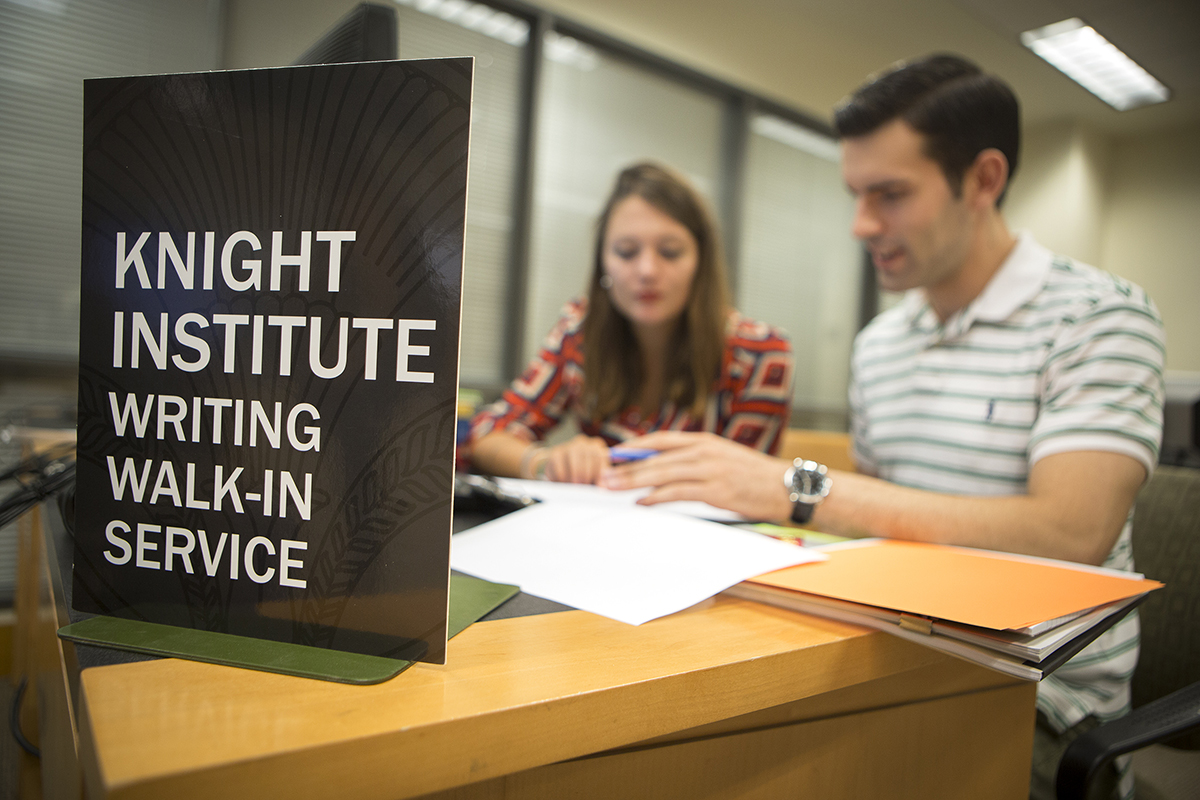Expanded Knight Institute gets new director
By Linda B. Glaser

Ten years ago, English professor Paul Sawyer became the fourth director of the John S. Knight Institute for Writing in the Disciplines. On July 1, Sawyer stepped down, turning over the directorship of an expanded program to fellow English professor George Hutchinson.
“These have been the 10 happiest years of my life at Cornell because I’ve been able to help others do work that no one of us could have achieved alone,” Sawyer said. “The senior lecturers of the program have really put the Knight Institute on the map.”
Hutchinson echoed this sentiment.
“I’m excited to be taking over and I’m grateful to the past directors who built the Knight Institute and developed its really powerful and extraordinary structure,” he said. “I think teaching writing is one of the most important things we can do at the university and it’s a privilege to work with the Knight Institute’s superb staff. Knight is a pretty special division of the university.”
According to Sawyer, one of the most important services Knight offers is the six-week teacher training course, which virtually every graduate student instructor for the First-Year Writing Seminar takes. The course, Teaching Writing 7100, includes basic principles of teaching writing as well as offering guidance in designing syllabi. There is a similar course for Writing in the Major instructors. “More than any other factor, this training impacts students,” Sawyer said.
The Knight Institute also offers a Faculty Seminar in Writing in June, an intense four-session training for which faculty must apply and for which they receive a stipend. Typically, eight faculty members from different disciplines participate.
Many of the recent changes at the Knight Institute have occurred in the Writing Walk-In Service, over the last eight years under the directorship of Tracy Hamler Carrick. During that time, the tutoring staff has increased 52 percent and now includes tutors from all seven colleges. Last year, the Knight Institute held more than 3,100 writing tutorials with undergraduates, a 116 percent increase from the 2007-08 academic year.
Carrick, who on July 1 became director of the Writing Workshop, supervisor and administrator of the Knight Institute support services, notes many of the innovations involve more specialized programming, so students can more easily find the resources they most need.
One example is the new multi-lingual tutoring program, where English language learners can work with graduate students who have special training and language experience. Unlike the general tutors, who focus on writing clearly and logically, these specialists can aid students in language development, including writing, speaking, listening and pronunciation.
“This program has become increasingly important as our international student population continues to grow,” says Carrick. “Approximately one-third of the students using the Writing Walk-In Services are not native speakers of English.”
Because each discipline has its own conventions, there is a particular need to teach writing to graduate students across disciplines. Graduate students and postdocs can now find specialized help from peer tutors through the Graduate Writing Service (GWS), first piloted by the Knight Institute in 2013. It is now a joint project of the Graduate School, the English Language Support Office and the Knight Institute. The GWS held 827 tutorials in writing and speaking last academic year.
The latest Knight Institute innovation, still being rolled out, is an online scheduling system that also enables students to send papers electronically and get feedback from a tutor by an agreed-upon time. Tutoring can also be done via chat or videoconferencing.
This electronic access is particularly important for students who are abroad. “This is a big deal for students taking a gap year before going to graduate school who need help with application essays and personal statements, as well as students doing field research or studying abroad,” says Carrick. “Thanks to this new system, we were able to help a student in the Middle East work through several dissertation chapters and a conference proposal.”
Not everything at the Knight Institute has changed in the last 10 years. The Institute continues to offer First-Year Writing Seminars (FWS) in one of the country's largest and most diverse programs in writing in the disciplines. Each semester, more than 100 different courses are taught in more than 30 departments and programs in the humanities, sciences, social sciences and expressive arts. More than 3,000 students enroll in the classes each year, with class sizes kept to no more than 17 or 18 students. Because the students come from all seven colleges, the classes often include the most diverse mix of students at Cornell.
The success of the FWS led to the creation of the Writing in the Majors program, which offers writing-intensive courses in non-humanities disciplines.
“The fundamental assumption of the course is that writing is essential to every discipline, including science,” Sawyer said, noting that students should learn how to write for particular audiences.
The influence of the Knight Institute extends beyond its core services. For example, Elliot Shapiro, director of Writing in the Majors, also administers the University Courses. Writing tutors are shared with other programs, like the Warrior Scholar Project, and the Knight Institute has offered courses for volunteers in the Cornell Prison Education Program.
Since 2003, Darlene Evans, director of Writing Outreach, has been teaching Common Ground, a FWS that places Cornell students in collaborative and mentoring relationships with students at local high schools and middle schools. The course, presented in a variety of models, has been a great success, says Evans, and she’s working on ways to expand engagement with local schools.
In her Writing Outreach role, Evans also supports programs in the Office of Academic Diversity Initiatives (OADI), particularly the OADI Research Scholars Program and the McNair Scholars Program, and serves as instructor and mentor for the Public Service Scholars Program for the Public Service Center and Engaged Cornell.
Linda B. Glaser is a staff writer for the College of Arts and Sciences.
Media Contact
Get Cornell news delivered right to your inbox.
Subscribe